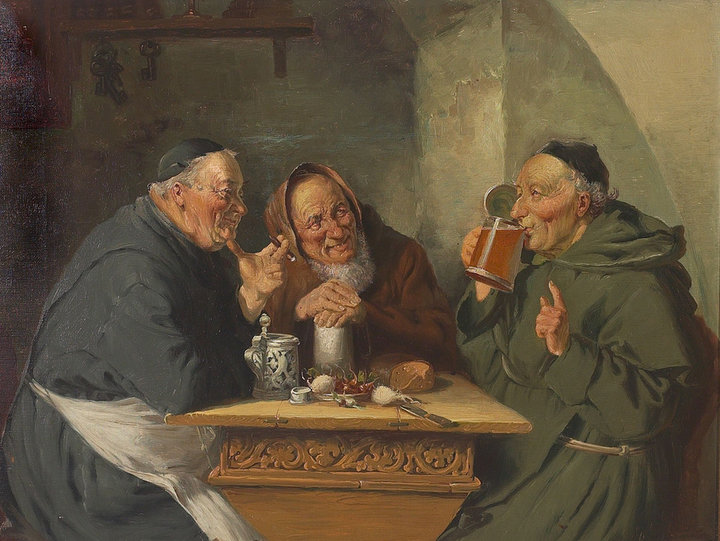Beer and civilisation
The first sip of beer at dinner is, for me, the best reward after a gruelling day at a trade show.
When, finally, after a day spent walking a maze of aisles and checking out endless booths (a member of the press is, inevitably, on the move all the time at trade shows), after attending all the press conferences and doing all my interviews I had scheduled, I can strip off my gray suit and put on my jeans to sit in a bar and order a pint, that is a moment of the day I enjoy the most.
When the first, prolonged, refreshing and bubbly sip of beer – to me, the first sip is always the best - comes to bring relief to my exhausted vocal cords and relaxes my nervous system after all the pressure of the day, I can definitely say I start feeling well with myself.
I reckon beer is the perfect, therapeutic, must-have aperitif. I have beer all the time before dinner, wherever I happen to be, even in countries where wines are more popular and would be expected to be a first choice when going for drinks - wine is fine, I just enjoy it more during dinner.
Today, beer is hugely popular in Italy as well. There are countries where beer has always been the “queen of drinks”, such as the Nordic countries, while it has not always been so sought-after in Italy as it is now.
When I was a boy, beer was basically limited to brands like Moretti or the famous ice-cold Peroni beer, depicted in a Fantozzi movie (a popular comedy movie series in Italy), where the main character, with one sip of beer, demolished the myth of an iconic arthouse movie like Battleship Potemkin (no reference intended to the tragic war events in Europe).
However, in recent years, things have changed radically, with beer reaching huge popularity. Today, along with the numerous brands of beer that cram store shelves, with all the possible variations on offer, it is quite common to be invited for dinner by friends who proudly offer you their own homemade beer, brewed with pretty much affordable beer making kits purchased on the internet – home-based biotechnology!
But how was beer first invented?

Quite a few brands refer to religion, religious people and places, such as abbeys, monks, friars. Therefore, a seemingly secularist spirit appears to originate from places with a completely different inspiration. The truth is that, actually, it is the other way around. References to wine and beer are also found in biblical texts and alcoholic beverages have always been considered a therapeutic means. The mystic Hildegard of Bingen, famous for her botanical research work and herbal treatments, also speaks of beer.
Nonetheless, whatever the origins of beer are, what is indeed surprising is that, in the early days of civilisation, along with key discoveries such as how to create and use fire or how to cook meat, there are testimonies that show that people in all corners of the inhabited world set the very foundations of biotechnology by managing to produce intoxicating substances through biological processes, such as fermentation.
Speaking of beer, we find the first traces of this beverage around seven thousand years ago!
Firstly, let’s define beer precisely.
Chemically, beer is the result of an alcoholic fermentation of wort with malted barley, seasoned with hops.
The first traces of beer date back to the Mesopotamian period and to ancient Egypt.
Obviously enough, it is an "invention" that appears in history when man turns from being nomadic to sedentary and therefore develops a food economy that leads to growing crops and breeding animals.
According to a few theories, bread and beer were invented at the same time. In fact, the basic ingredients are basically the same - water and flour – and are just fermented in different proportions to make either bread or beer.
Beer brewing was a profession in ancient Mesopotamia and the famous Code of Hammurabi regulated the production of beer, to the extent that forms of punishment, which included being sentenced to death, were inflicted to anyone who did not respect the proper production protocols - in comparison, food fraud is punished with much lighter sanctions today.
Beer had religious and healing connotations even in ancient Egypt, where it was also produced industrially, compared to smaller-scale production in Mesopotamia.
Scaling up production of beer brings us to today, where we can think of beer brewing as something that is either artisanal, that is, made by smaller brewing companies, with countless beers produced and made available locally, or industrial, which yields beer on a much larger scale. Industrial beer brewing is a huge business, with many popular brands. Anyone who has visited Amsterdam has most likely visited the Heineken brewery for instance, a brand available all over the world owned by a company that has also acquired many minor brands, typical of certain countries or areas, and has managed to preserve their characteristics, such as the use of locally sourced water in the first place, which is not the same everywhere and strongly determines the quality of a beer product.
Running further along the history of beer, the beverage is then further developed by the Germanic populations. The term "bier" has a Nordic origin and was used to replace the Gallic term "cervogia", identifying a beer produced without hops – Spain still uses the similar term “cerveza” to refer to beer in general.
Eventually, beer also made its way to the monasteries since, as mentioned earlier, beer (and also wine) was also viewed as a means for healing the sick and as support and relief for pilgrims seeking shelter as they travelled the routes of Christianity on foot.
Later, the industrial revolution will turn beer into a mass-produced beverage and bring the technological evolution to improve the brewing process, as well as pasteurization, the diversification of ingredients to make different types, etc.
Speaking of barley, the mind goes to other cereals, like corn and wheat, and Ukraine, the world’s breadbasket that is so dramatically affected by war today. Globalisation has accustomed us to unifying the flavour of things as well. To be honest, excluding the world of artisanal beer brewing, a good beer from a large producer tastes the same almost everywhere.
I believe that, today, we are, unfortunately, much more aware that what until some time ago was "just" a sip of beer or a mouthful of bread, today also recalls the history of our civilisation and reminds us of our responsibilities, both individual and collective, in preserving the world as we know it and fostering its progress.

Listen!
PODCAST
Listen to the article!
Voice: William Scott Agostini
TKS Publisher staff







